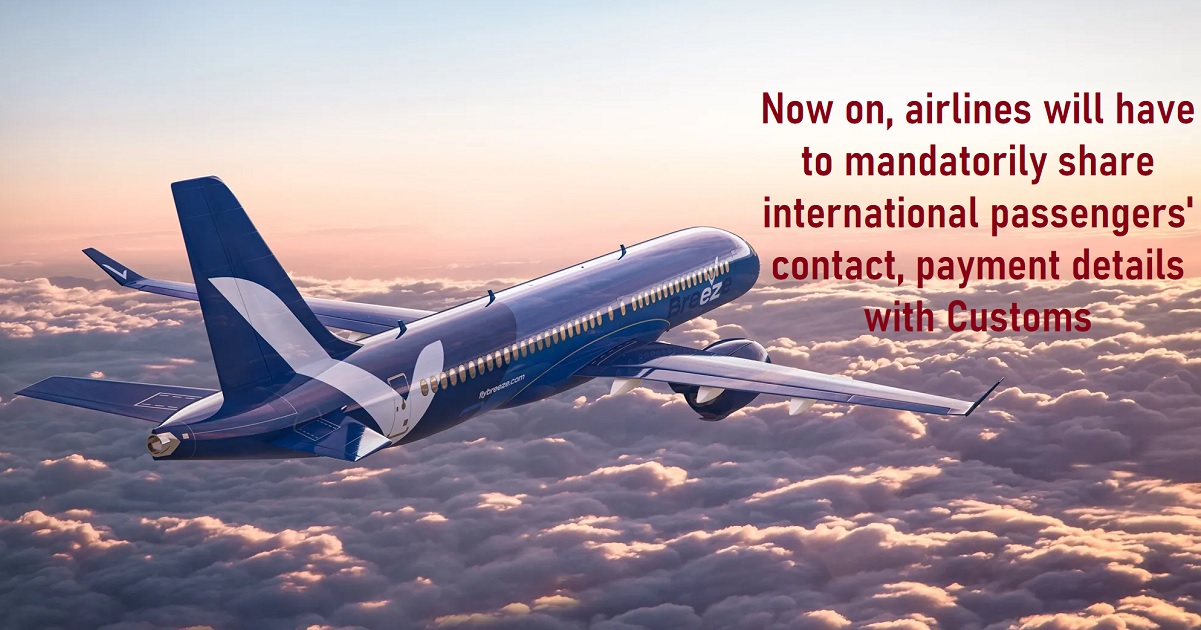
New Delhi: In a move which will help prevent law offenders from fleeing the country, airlines will have to mandatorily share PNR (Passenger Name Record) details of passengers with customs authorities 24 hours prior to departure of international flights. The information, which shall include name, contact details and payment details, will be used by the customs department for improved surveillance and risk assessment of passengers entering or leaving the country, according to a finance ministry notification.
The Central Board of Indirect Taxes and Customs (CBIC), under the finance ministry, on August 8 notified the ‘Passenger Name Record Information Regulations, 2022’, which aims at ‘risk analysis’ of passengers to prevent economic and other offenders from fleeing the country as well as check any illicit trade such as smuggling. ‘The National Customs Targeting Centre-Passenger’, set up by the CBIC, will process information for the prevention, detection, investigation and prosecution of offences under the Customs Act and also for the law enforcement agencies or government departments or any other country, it said.
With this, India joins 60 other countries that collect PNR details of international passengers. Airlines at present are required to share passenger information limited to name, nationality and passport detail in advance with the immigration authorities. The government had proposed the requirement of airlines sharing PNR details of passengers 24 hours in advance in the Union Budget for 2017 but a formal process for communication of the passenger data has only been formalised now with the notification issued on Monday.
‘Every aircraft operator shall transfer the passenger name record information… of passengers they have already collected such information in the normal course of business operations, to the designated customs systems,’ the regulations said, adding every aircraft operator will have to seek registration with customs for its implementation. The information to be shared by airline companies for both inbound and outbound international flights include the name of the passenger, billing/payment information (credit card number), date of issue of ticket as well as intended travel, and names of other travellers in the same PNR, travel itinerary for the PNR, contact details like email id, mobile number, details of travel agency, baggage information and code share information (when one airline sells seats on another air carrier’s flight). While the regulation did not state the reason for seeking such information, analysts said this was to prevent bank loan defaulters from fleeing the country to avoid prosecution.
According to information furnished by the government in Parliament, a total of 38 economic offenders, including Nirav Modi, Vijay Mallya and Mehul Choksi, fled the country in the last five years. Industrialist and former MP Vijay Mallya left the country on March 2, 2016, the day a clutch of public sector banks moved the Debt Recovery Tribunal to recover Rs 9,000 crore unpaid dues to his now-defunct Kingfisher Airline. Mehul Choksi, one of the prime accused in the alleged over Rs 13,000-crore PNB loan fraud case, too fled to Antigua and Barbuda just as ED and CBI zeroed in on him.
‘Every aircraft operator shall transfer passenger name record information not later than 24 hours before the departure time; or at the departure time – wheels off,’ the regulation said, adding the information would be retained in the customs systems for up to five years. It further said that for each act of non-compliance to these regulations, the aircraft operators would have to pay a penalty of a minimum of Rs 25,000 and a maximum of Rs 50,000. With regard to sharing of information with other law enforcement agencies or foreign states, the regulation said that the National Customs Targeting Centre-Passenger may share the relevant information on a ‘case-to-case basis’ with other law enforcement agencies or government departments of India or any other country.
KPMG in India, Partner, Indirect Tax, Abhishek Jain said the objective of said regulations is to obtain relevant passenger data for risk analysis to proactively prevent, detect, investigate or prosecute offences under the customs law or any other domestic or international law.
‘The onus of timely collecting and sharing such information has been put on the airline operators. Further, while strict privacy guidelines have been stipulated under the said regulations, the government should ensure that the same are duly enforced to prevent unauthorised usage,’ Jain added.

Post Your Comments